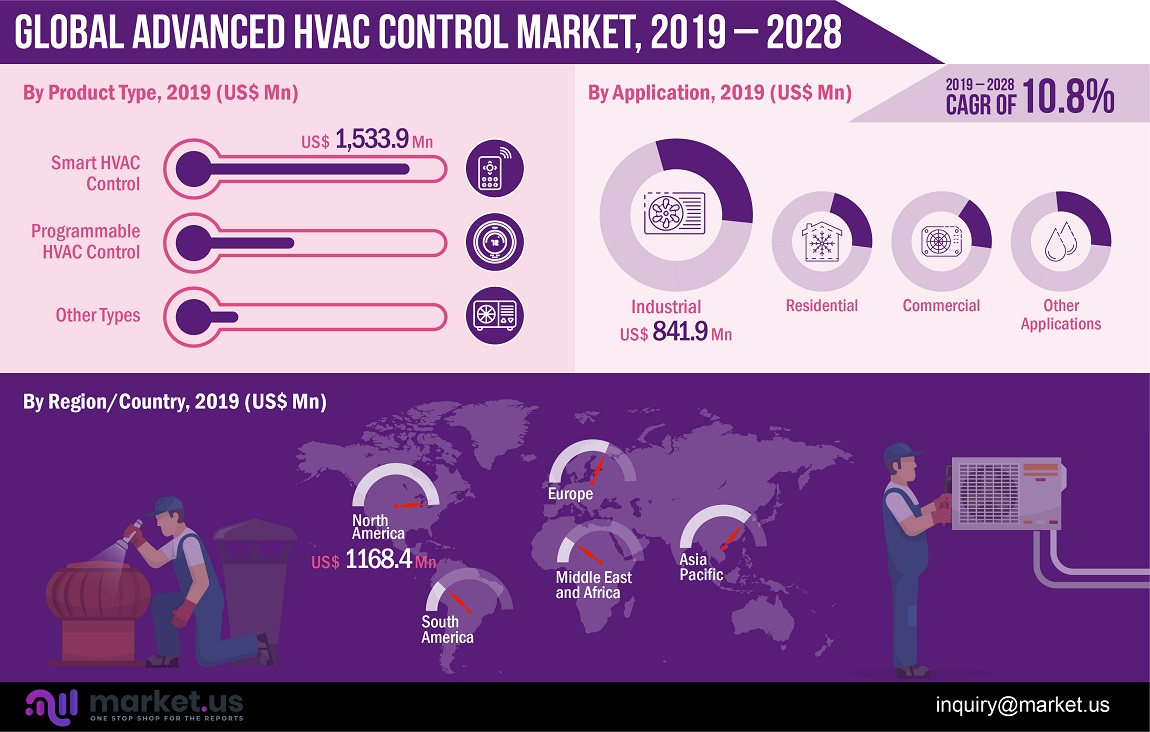
Advanced HVAC control Market Infographics Description:
The global advanced HVAC control market showcased a robust initial valuation of approximately USD 2,712.7 million in 2019 and is projected to experience substantial growth, forecasting to reach about USD 7,706.3 million by 2029. This expansion represents a compound annual growth rate (CAGR) of 10.8% from 2020 to 2029. The surge in the market is primarily fueled by the rapid advancements in technology and the increasing adoption of smart devices within the industry. These innovations are reshaping the HVAC landscape by introducing more efficient and environmentally sustainable solutions. The integration of advanced technologies facilitates enhanced system performance and energy savings, aligning with global sustainability goals and increasing consumer demand for greener building solutions.
In the product segment, smart HVAC controls are emerging as the market leader, expected to register the most rapid growth with a CAGR of over 13.4% throughout the forecast period. This significant growth is largely attributed to advancements in the Internet of Things (IoT) technology and the widespread adoption of smart devices, which are revolutionizing the way HVAC systems operate. These smart controls improve HVAC efficiency by using remote sensors and automation to adjust settings based on real-time external environmental data. This not only helps in optimizing the performance based on actual needs but also enhances user convenience by allowing remote control of systems, thereby providing better energy management and reduced operational costs.
The industrial segment of the market accounted for a significant revenue share, generating approximately USD 841.9 million by the end of 2019. The growth in this sector is driven by the increasing implementation of building automation systems (BAS), which integrate HVAC controls with other building systems to allow for centralized management. This is particularly important in industrial settings where large-scale systems require robust management tools to operate efficiently. BAS helps in reducing energy consumption and operational costs while improving the overall system reliability and lifecycle, making it an essential component of modern industrial infrastructure.
Regionally, North America is expected to maintain its dominance in the global advanced HVAC control market during the forecast period. The region’s lead is supported by the early adoption of cutting-edge technologies, a strong industrial base, and substantial regulatory support for energy-efficient systems. Additionally, North America’s focus on sustainable building practices and the modernization of old infrastructures are expected to continue driving the demand for advanced HVAC controls. The presence of major market players and continuous investments in R&D for developing innovative solutions also strengthen the market growth in this region.
Key players in the market such as Alphabet Inc., Schneider Electric SE, Honeywell International Inc., Siemens AG, Ingersoll-Rand Plc, Johnson Controls International Plc, and Lennox International Inc. are at the forefront of driving innovation within the industry. These companies are not only investing in new technology and research to stay ahead of the curve but are also engaging in strategic partnerships and acquisitions to expand their market reach and enhance their product offerings. Their active involvement in developing smarter and more efficient HVAC solutions underscores the competitive nature of the market and highlights the ongoing evolution in HVAC technology.





